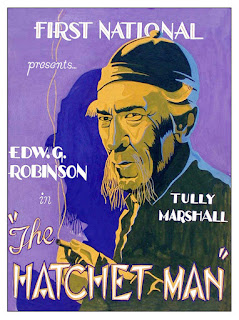Wong Low Get (Robinson) is the titular Hatchet Man for the Lem Sing Tong in San Francisco (a Chinese brotherhood that by modern standards would be the local mobsters). The title of Hatchet Man is, as the opening crawl informs us, an honorable one that is handed down from father to son. Following the death of the Tong's leader, the new chief, Nog Hong Fah (Dudley Digges) orders Wong to murder his best friend, Sun Yat Ming (J. Carroll Naish), who was complicit in the death of the leader. Sun realizes that his death is imminent, and so makes out his will, leaving his fortune and the care of his 6 year old daughter, Sun Toya San (who will grow up to be Loretta Young), to the care of Wong. His will also expresses his desire that Toya will wed Wong when she is of age. The men talk, Sun forgives his friend for the deed he must commit, and Wong throws his hatchet. We see a doll fall from the hand of the young Toya, its head hanging by a thread. And then the story jumps forward 12 year.
We've already mentioned that this is a movie about the Chinese in America in which not ONE Chinese (or Asian) person appears. As politically incorrect as this is in the 21st Century, this was standard practice in Hollywood in the 1930s and 1940s. As this TCM article points out, it was crucial to have a star name to tout, and those stars, of course, were Caucasian. But, if you had a Caucasian done up to look Asian, next to a person of genuine Asian ancestry, the make-up on your white actor looked outlandish. So, the decision was to hire an all-white cast, and everyone's make-up was the same. Only here, it really isn't, as Edward G. Robinson is barely made up, compared to Loretta Young or Leslie Fenton (Harry En Hai). As a result, Robinson maintains the facial expression that is crucial to his characterization while the other actors look as though they are wearing Halloween masks.
The other problem with the movie, from a modern perspective, is the relationship between Wong and Toya. Wong raises her as a daughter, then marries her. It is a trifle disturbing to think about, especially when you throw into the mix that Wong murdered her father. But, Robinson's skill as an actor helps to mitigate the audience discomfort. He is loving and gentle - he is even surprised when Toya consents to their marriage. It's because of Robinson that the viewer can't help but feel sympathy for Wong.
The wonderful character actor J. Carrol Naish has a VERY small part, but as with most things Naish does, you don't forget him. Naish had a long career, from 1925 until 1971. He made the transition to television fairly seamlessly, and probably appeared as a member of every ethnic group on the planet. He was nominated for two Academy Awards (for Sahara in 1943 and A Medal for Benny in 1945, for which he was awarded the Golden Globe award). Naish married his wife Gladys in 1929; they had one child and were together until his death of emphysema in 1973. In his last role, he starred as Dr. Frankenstein in the low-budget Dracula vs. Frankenstein (which also featured Lon Chaney, Jr.).
Back in 2013, when we discussed She Had to Say Yes, we talked about Loretta Young and her relationship with Clark Gable. A new article on Loretta Young was recently released, and in light of our prior conversation, we thought it important to alert you to this new information. Ms. Young's son, Chris Lewis, spoke to an interviewer about conversations he and his wife Linda had with Ms. Young. After watching an episode of Larry King Live in 1998 (a show Ms. Young watched regularly), she asked Linda what "date rape" was. Linda explained, and Ms. Young stated “That’s what happened between me and Clark.” Ms. Young asked her son and daughter-in-law to keep the secret - she didn't want daughter Judy to think that her conception was totally without love. But, with Judy's death (of lymphoma) in 2011, Chris and Linda felt it was time to confess his mother's secret, and though neither party from that night is there to confirm or deny, it is an important story to tell. We hope you will read the article above.
Directed by William Wellman, the movie is fascinating to watch primarily because of the ending (which we will avoid telling you). It's interesting that, in a contemporary New York Times review critic Mordaunt Hall had no compunction about blowing the ending. I know my fellow blogger at Pre-code.com was not impressed with the film, and while The Hatchet Man is far from perfect, we think it is worth viewing, if for nothing more than to see the ending. We will just say that words have power, and curses aimed in the right direction can achieve as much as a weapon.
We leave you with an early scene from the film - the introduction of Wong Low Get:



No comments:
Post a Comment
Thanks for your interest in this blog. Your comments will be moderated to minimize spam to the website. Thanks for understanding.